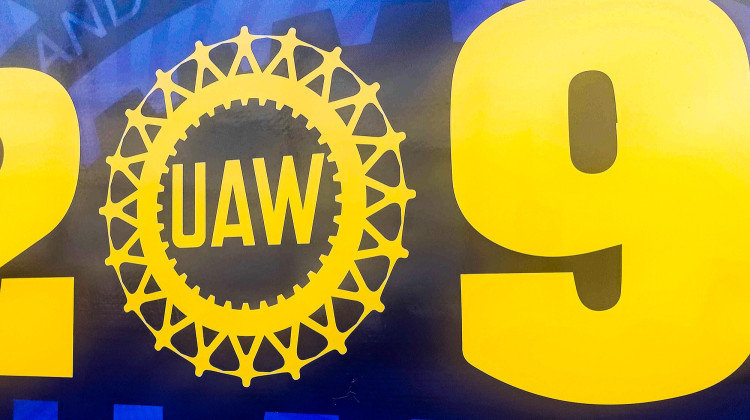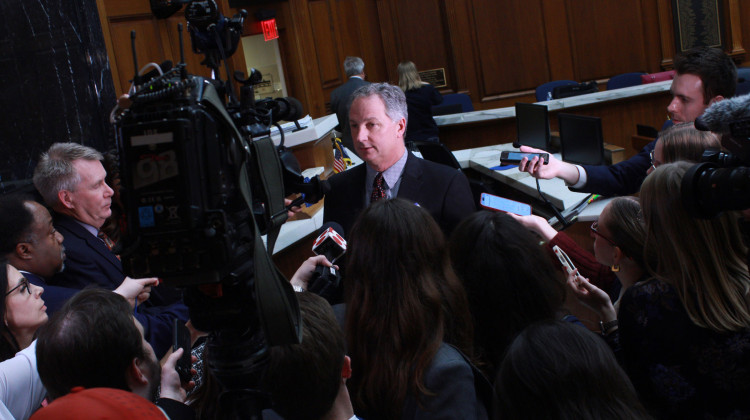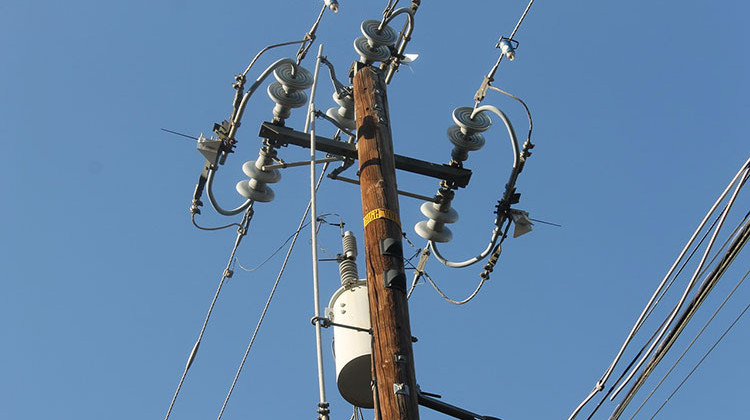
One estimate by the Anderson Economic Group suggests a 10-day strike at all three automakers could cost the US economy $5 billion.
Adam Yahya Rayes/IPB NewsIf General Motors, Stellantis and Ford don’t offer contracts that satisfy enough United Auto Workers union demands by Sept. 14, thousands of workers in Indiana and nationally will walk off the job. A strike could cost the companies, the national economy and the workers a lot of money.
General Motors and Stellantis made contract offers this week that the companies say included around 15 percent wage increases for most workers – well short of the more than 40 percent increase the union wants. In a video about the offer posted online, GM President Mark Reuss said the company faces “fierce competition.”
“But I am confident that we have what it takes to win and win together,” he said. “And that's why we need a fair contract that both rewards our employees and protects the long term health of our business.”
In a similar video, Stellantis’ head of North American manufacturing Mike Resha said the company’s “opening offer” is a “responsible” and “strong” proposal.
UAW International President Shawn Fain called the companies’ offers “deeply inadequate” and “insulting” in a Facebook livestream Friday. He displayed a trash bin in the background with the “Big Three Contract Proposals” written on it.
“Sept. 14 is a deadline, not a reference point for all three of these companies. Finally after weeks of delay, we have counter offers in from each company and I've filed them in their proper place again,” Fain said, pointing at the trash bin.
Fain made clear that the union is willing to go on strike at all three companies. That would be a departure from the UAW’s past practices of picking one “target” to strike while negotiating with the other two.
Union workers get strike pay while on the picket lines. And the UAW recently increased the pay they get to $500 a week. Amber Kidd works at GM’s Fort Wayne assembly plant.
“We don’t want to be out for months at a time, but if it’s going to benefit us in the long run, yeah, we’re going to stand out there with our signs, and we’re going to be heard,” she said.
Kidd said she’s been taking extra overtime in anticipation of the strike.
“I have a son. I have bills,” she said in an August interview. “So any extra money that I can put aside leading up to that so I don't have to worry while we're on strike, because we never know how long it's going to last.
Derek Cronin is president of the UAW Local 440, which represents workers at a GM aluminum casting plant in Bedford. Like the leaders of Local 2209 representing GM workers in Fort Wayne, Cronin said he doesn’t expect the company will meet UAW demands by the deadline.
“We don't want to strike. It's one of those things that disrupts lives for the folks out on the floor where we hope and pray that there's an amicable agreement that meets the needs of both the company and the members,” Cronin said in a Sept. 6 interview. “But the general sense on the floor is, we really do believe that there's no getting around it … So there is a little bit of a kind of a looming sense that, yeah, the strike is going to happen.”
Cronin said his members feel that they’ve given up a lot of ground on wages and other issues in the contract negotiations since GM’s 2009 bankruptcy.
“The prices of vehicles are going up despite labor costs only being about 5 to 6 percent of a vehicle,” he said. “So the membership sees that, you know, we've made these billions and billions of dollars in profit and they're not seeing their wages keep up with that.”
Join the conversation and sign up for the Indiana Two-Way. Text "Indiana" to 73224. Your comments and questions in response to our weekly text help us find the answers you need on statewide issues.
Garry Quirk is president of UAW Local 685, which represents workers at several Stellantis plants in Kokomo. He’s said he feels more unsure about the likelihood of a strike than his GM counterparts in Fort Wayne and Bedford.
“If we do strike, right, it affects more than just our people. It affects the small businesses around us … it just has a toll on everything, even the parts supplier,” he said. “Nobody benefits from a strike. But, that's one of the tools we have. And if that's what it takes, then that's what we have to do.”
Local 685 Vice President Denny Butler said he hopes the union can avoid going on strike because he’s concerned about how well workers are prepared for the cost of a strike.
“We've got a lot of younger generation … and they haven't been in the situation that we're getting ready to be in,” he said. “I don't think they fully prepared for it. They can't afford to save because they're living paycheck to paycheck because of their wages.”
One estimate by the Anderson Economic Group suggests a 10-day strike at all three automakers could cost the U.S. economy $5 billion.
“I believe Stellantis has made profits, after profits, after profits. And still at the end of the day, we're still sitting here with no raises or any justice for us,” said Local 685 President Quirk. “And everybody wants to talk about, if we get pay raises the [cost] on vehicles are going to go higher. Well, they've been higher now.”
Quirk notes that Stellantis’ CEO Carlos Tavares recently got a pay increase: “22 percent year-over-year to $24.8 million” for his 2023 total compensation package, according to the Detroit News.
“You don't see big, splashy nightly news segments on how consumers will be impacted by companies choosing to spend billions on executive salaries and stock buybacks and special dividends,” said UAW International President Fain at the start of his Facebook live on Friday. “No, you only hear these concerns when the working class stands up and demands a fair share of the value we produce.”
Adam is our labor and employment reporter. Contact him at arayes@wvpe.org or follow him on Twitter at @arayesIPB. Contact WBOI's Tony Sandleben at tsandleben@wboi.org or on Twitter at @tony_WBOI.
9(MDAyMzk1MzA4MDE2MjY3OTY1MjM5ZDJjYQ000))
 DONATE
DONATE








 Support WFYI. We can't do it without you.
Support WFYI. We can't do it without you.